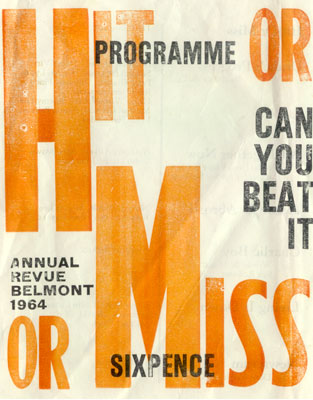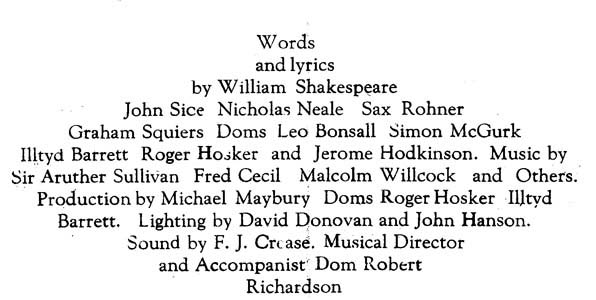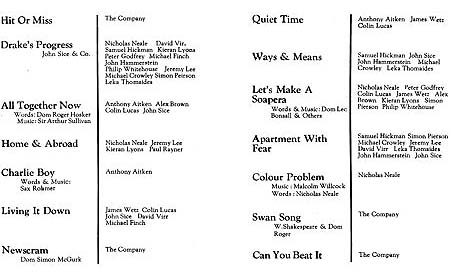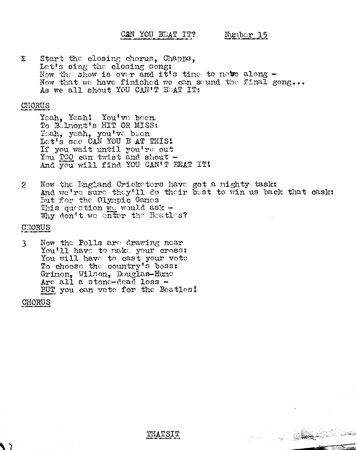



THE VERY FACT THAT the usual heated argument developed
over whether " Hit or Miss " was or was not up to the
standards set by its illustrious predecessors would seem
to indicate that this year's half-term revue was a success. It was
certainly a very lively and provoking show, incorporating as
usual a good deal of new material with some old favourites
from the past. With the general election a certainty in the
autumn, the songs and some of the sketches had a markedly
political twist, while the arrival of four royal babies, the
production of—at last—Cleopatra, and the Beatles craze, all
provided ideas and themes for the revue. The opening and
closing numbers gave the clue to the title chosen for this
year's show : a decorous group of flannelled and boatered
golden youth is shaken by the arrival of four very convincing
" Beatles," in the shape of Aitken, Lyons, Peirson and Lucas,
who soon persuaded our jeunesse dome that to " Twist and
Shout " Was a good thing.
" Drake's Progress " with the debonair Sammy Hickman
as Drake was very well done indeed, despite some of the more
corny cracks like " that was no cutlass, that was my knife."
One of the most fascinating things about this number was
Philip Whitehouse as a master gunner who had run out of
cannon balls. The main fault was that it had two or three
endings too many—at least, so some critics thought—though
the whole thing was pretty slick and deftly managed.
Tony Aitken, Alex Brown, Colin Lucas and John Sice were
excellent in their " All Together Now " : a satire on the hopes
for Christian Unity as expressed by an " Anglo-Catholic
parson, a very Irish Roman Catholic priest, a Jehovahs
Witness, and a " Nonconforming Christian." The words by
Dom Roger were set to " In a Contemplative Fashion " from
Act Two of The Gondoliers and provided us with one of the
wittiest and most entertaining numbers of the evening.
" Home and Abroad," with Nicholas Neale, Jeremy Lee,
Kieran Lyons and Simon Peirson, provided an interesting
commentary on the differences between the English and
French ways of life. Lyons was particularly good here as the
mother, while Nicholas Neale was far better in the second part
of the number as a French father.
" Newscram " was a completely new number satirizing
ITV news programmes and commercials, with James Wetz
and Sammy Hickman as a pair of fast-talking, slick, syn-
thetically charming newscasters. Particularly good was Alex
Brown's report from Rome on the Dutch-Spanish royal wedding
at St. Mary Major's, where Cardinal Giobbe, " reverently and
with great calm, ordered a search for the bride and groom."
Leka Thomaides stole the show in " Ways and Means " as
an extremely black and very savage African chieftain who sent
his son to Eton, and who was proof even against the fading
charms of the C.O's daughter, John Hammerstein. John Sice
first appeared here as the clown of the evening, and did some
admirable filling in with " quickies " later on.
Belmont has never done TV " Soap Opera " until, this year,
it was decided that a take-off of this debased form of popular
entertainment could be done for the revue. " Let's make a
Soapera " was certainly very funny—quite hilarious in parts
—but one felt that the gypsies, who all looked most con-
vincing, were never quite at ease, as their Gypsy King, on the
other hand, most obviously was. Still, Belmont produced its
first instrumental group for the Soapera with Mr.Zeuner
playing his euphonium, assisted by clarinetists Forlin and
Connell. The strange noises only added to the general madnes
of what was going on up on the stage.
One old favourite which improved on re-acquaintance was
" Apartment with Fear," in which Michael Crowley produced
some most professional blood-curdling noises as a sort of
Madame Frankenstein or Baroness Dracula. John Sice's
ingenuity was tested to the utmost to judge by the strange
shapes, satisfyingly grotesque, with which he enlivened the
scene, and made the macabre situation even madder.
Undoubtedly the best and most satisfying number of the
evening was " Swan Song "—with magnificent conceit, the
programme informed us that the words were by " W. Shake-
speare and Dom Roger Hosker." One was amazed at the
incredible ingenuity with which Antony and Cleopatra, Macbeth,
Titus Andronicus, Hamlet, Romeo and Juliet, Richard II, etc.,
were all combined to fit in as a satire on Elizabeth Taylor and
Shakespeare's quater-centenary year. Alex Brown provided a
most ravishing Cleo, dressed in an assortment of nightgowns,
while one of the most effective entries was surely that of
Peter Godfrey as Macbeth with diminutive swordbearer in the
shape of Virr. But the whole thing defies analysis : the number
never flagged from beginning to end; it was kept swiftly
moving and never allowed to drag, and was sheer delightful
entertainment—need I say more ?
There is lots more that should be said about the revue and
the individual numbers in it, and the individual people who
worked so hard in it, but praise is certainly due once again to
Dom Roger and his assistants for a first-rate production, to
Mr. Crease for never failing ingenuity in improvising sound
effects, and to all the company, both on-stage and off-stage,
whose hard work and enthusiasm made such an enjoyable
evening possible.
B.I.B.